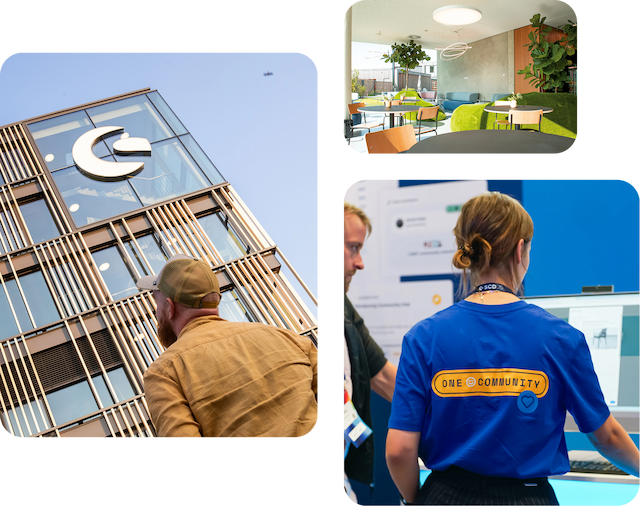
Today's global situation confronts businesses with challenges that reach far beyond their day-to-day operations. Geopolitical tensions, trade disputes, and shifting regulatory landscapes are increasingly shaping discussions at the C-level. In particular, the current unpredictability surrounding U.S. economic policies is having a profound impact on the ecommerce sector. New tariff announcements repeatedly call into question the reliability of the American market, while at the same time, concerns around vendor lock-ins, platform dependencies, and the potential loss of technological autonomy continue to grow.
In this first installment of our three-part blog series, “Ecommerce in uncertain times,” we put the spotlight on why selecting the right ecommerce platform is now a critical strategic decision. Because, given today's shifting global conditions, selecting the appropriate solution has become much more than just an IT issue.
Why CEOs need to rethink their ecommerce platform now
From Adobe Commerce (formerly Magento) and Salesforce Commerce Cloud to BigCommerce, many of the leading ecommerce systems serving ambitious mid-market and enterprise-level businesses today are developed and operated by US-based companies.
These platforms dominate globally, influencing markets and shaping ecommerce standards. However, as trade relations between the US, Europe, and other regions become increasingly volatile, business leaders are forced to reconsider their reliance on these providers. Several key factors make this evaluation crucial:




In short, decision-makers must proactively evaluate whether their current ecommerce platform can truly offer long-term strategic security in the face of evolving geopolitical dynamics and regulatory shifts.
What future-proof ecommerce platforms must deliver today
How do you best prepare for uncertainty and rapid change? By building resilience. This principle holds true across business and everyday life – and ecommerce platforms are no exception. A resilient ecommerce platform today must meet several essential criteria:
Flexibility and modularity: It starts with the ability to choose the features and pricing models best suited to your needs. Equally important is the underlying technology stack. Platforms must seamlessly integrate into your existing IT infrastructure through standard APIs, ensuring sustainable adaptability. In today’s rapidly changing ecommerce landscape, this flexibility is indispensable.
Compliance readiness: Beyond GDPR compliance, your platform must accommodate country-specific regulations, taxes, multilingual capabilities, and multiple currencies. This is especially crucial if Europe is a significant market for your ecommerce business.
Complete control: “Own your platform” is a core principle guiding the choice of SaaS and PaaS solutions. Full control over your platform’s technological infrastructure – including the freedom to modify or expand it whenever needed – ensures lasting business agility. For precisely this reason, some businesses continue to favor an on-premise hosting approach.

In short, a truly future-proof ecommerce platform aligns fully with established EU regulatory standards, grants merchants complete accessibility, and allows extensive customization. This positions your business ideally for a future marked by rapidly shifting economic relationships and quickly emerging global trends.
Shopware’s answer to uncertain times
At Shopware, we understand the current challenges businesses face and stand firmly for clear principles: European values, independence, and openness. Our ecommerce platform offers a compelling alternative for companies seeking stability and long-term strategic security.
Built in Germany and based on open-source technology, Shopware ensures full technological independence, eliminating the risk of vendor lock-ins. This empowers businesses with complete control over their data and infrastructure.
Moreover, Shopware fully complies with EU data protection standards (GDPR) and provides a modular, highly adaptable platform supported by a vibrant, community-driven ecosystem, enabling businesses to quickly respond to evolving market conditions.
Our pricing structure is transparent, without hidden costs or obligations to migrate to predetermined infrastructure. This gives CEOs and decision-makers a solid strategic foundation to proactively manage uncertainties and confidently address future business challenges.
Key features that make Shopware the perfect choice in economically volatile times include:
On-premise hosting option: Shopware is among the few platforms offering comprehensive on-premise hosting capabilities, granting maximum control over your ecommerce environment.
Flexible deployment options: Beyond on-premise hosting, Shopware supports diverse cloud providers such as AWS, Google Cloud, Microsoft Azure, or even your local hosting provider of choice.
Robust partner network: Shopware maintains an extensive network of development partners and ecommerce agencies, ready to assist merchants at every step.
Full data sovereignty: Our customers retain complete control over where and how their data is stored. Shopware guarantees 100% GDPR compliance.
Best of both worlds (B2C & B2B): Shopware is specifically built for both consumer and business commerce, delivering extensive out-of-the-box functionalities suitable for both models.
Conclusion and outlook
The current disruptions reshaping global trade undoubtedly pose challenges – but they also reveal significant opportunities. As the U.S. and China find themselves locked in escalating trade conflicts, Europe stands to benefit, both through increased domestic demand for locally produced goods and by positioning itself internationally as a stable, reliable trading partner.
Seizing these opportunities, however, demands rapid response and maximum flexibility. Businesses must rely on a robust, future-proof ecommerce platform capable of meeting rigorous regulatory and technological requirements, yet agile enough to quickly adapt to shifting market conditions and evolving customer expectations.
In the next part of our blog series, learn how global brands have successfully transitioned to Shopware, strengthening their resilience and maintaining agility even amid economic uncertainty.











